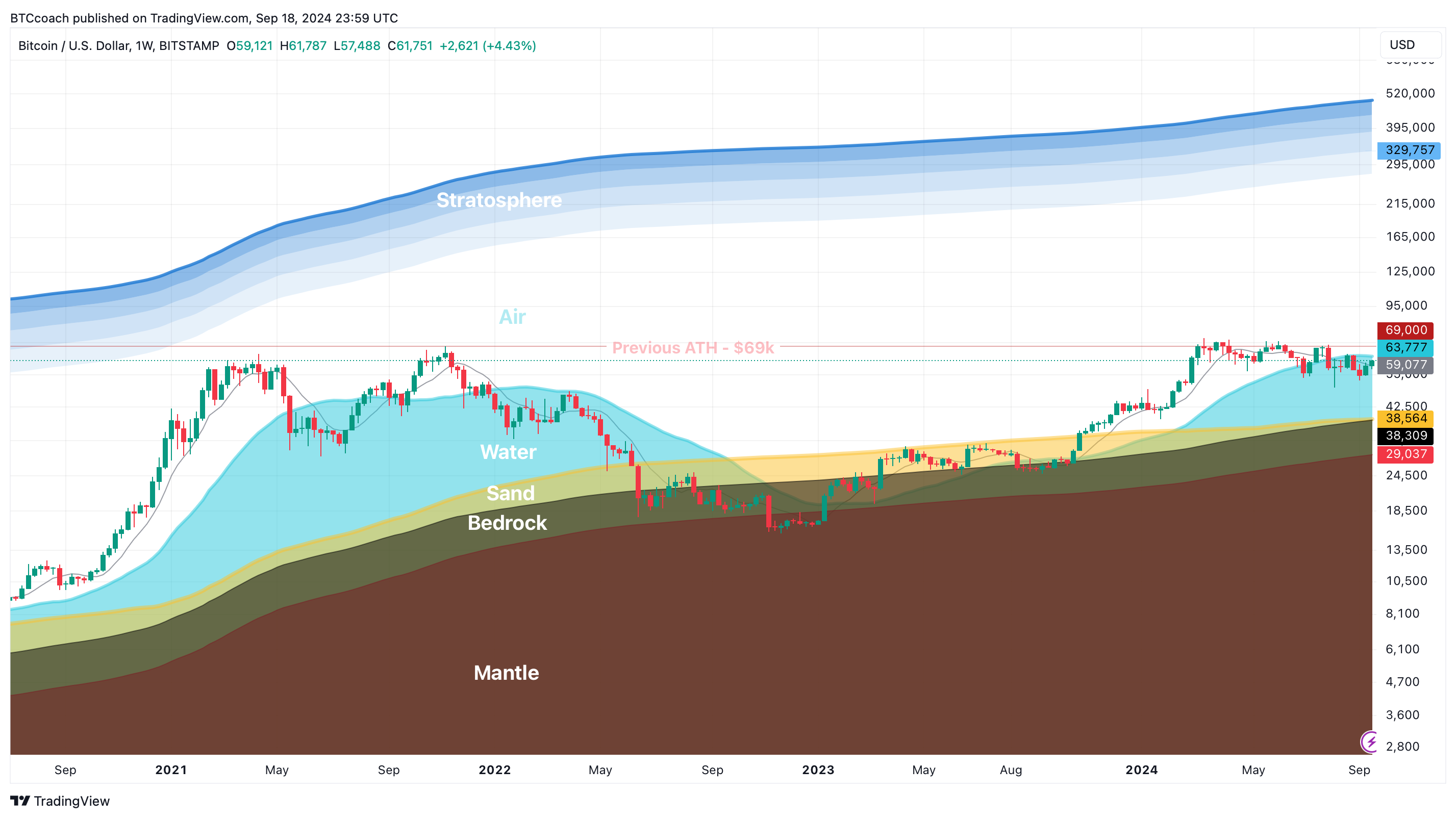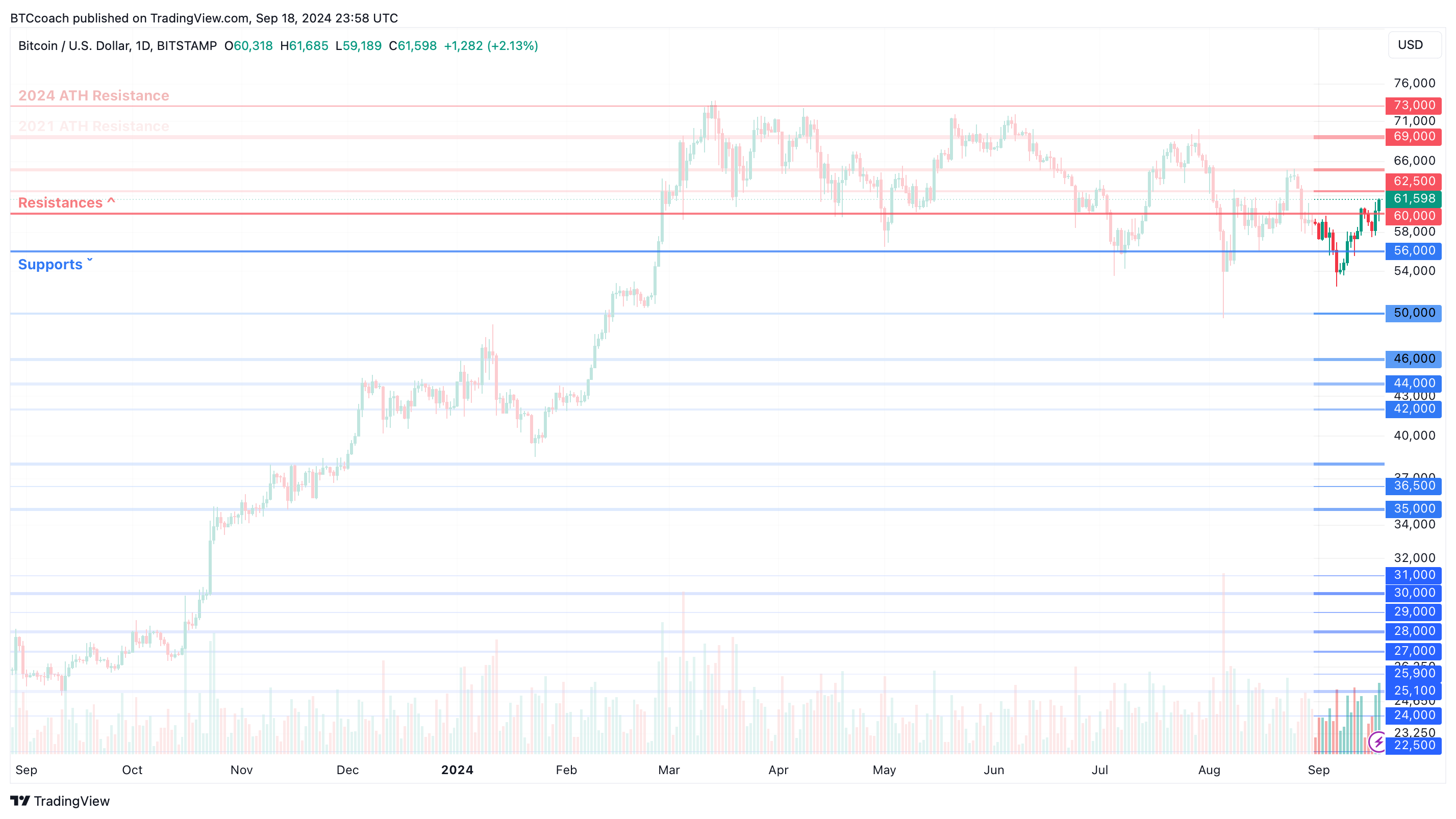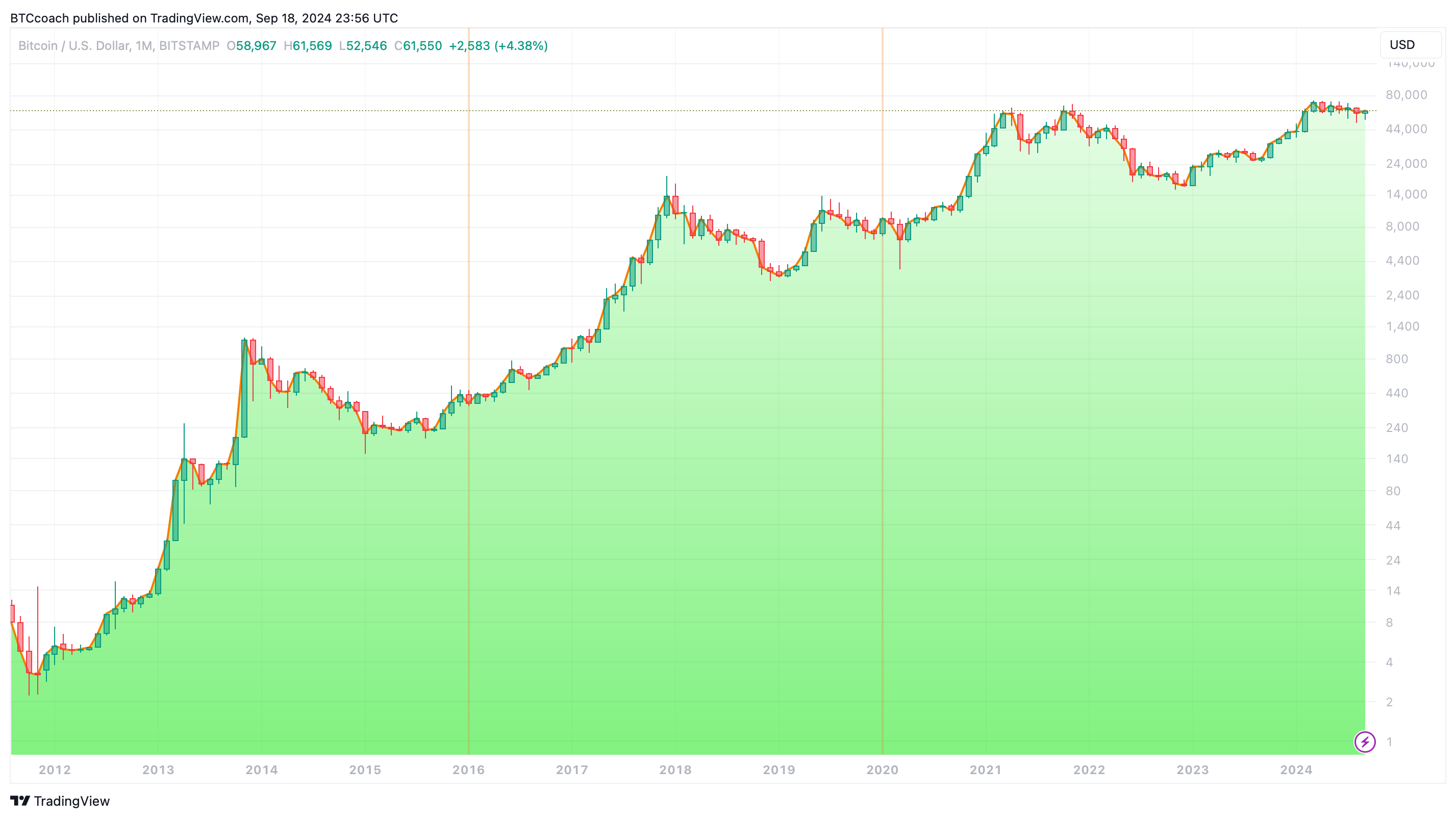Is "blockchain" a scam?

Last week I got the following question:
I was writing about Bitcoin and using chatGPT for research. It kept responding that Bitcoin is only "one of the many applications for blockchain." I honestly still think "blockchain" stuff is a scam but I wanted to ask your opinion, are you still a maxi?
—Roberto
My 2-second response is "yes, blockchain is bullshit, stick with BTC only."
But the question really deserves more nuance. It's particularly interesting to me for two reasons:
a) We're going to see a huge new push to shove "blockchain" down our throats as the BlackRocks of the world set out to tokenize the very air you breathe
1.A breadth of institutional grade custodians who can support both crypto and tokenized assets.
— Gif⚰️® (@gifdead) September 16, 2024
2.Big credible trading marketplaces for tokenized assets such that the liquidity value proposition today is mostly theoretical around what tokenization can manifest.
3.Regulatory…
b) you should be aware that —useful as it may be for many things— ChatGPT is still a horrible resource for learning about Bitcoin. Its responses tend to be uninformed, outdated and/or heavily biased towards "crypto".
Anytime you're tempted to pay attention to a "blockchain" project you should ask yourself: why don't they just use a database?
Sidenote: The specific meaning of words is important, for example: never-coiner Jamie Dimon says they're huge users of "blockchain". The reality is they use a custom Ethereum fork proprietary to them. This "walled garden" model may turn out to be a smart approach for corporations, but it's a wholly different game from that of traditional open blockchains, which are my focus here.
Jamie Dimon says JPMorgan Chase is 'probably one of the bigger users of blockchain' https://t.co/oUBbeap6bN
— The Block (@TheBlock__) September 17, 2024
,
Fun fact: Satoshi never once used the term "blockchain". He did use "timechain" though, so when I say "blockchain" I'll be referring to non-bitcoin technology.
Since ChatGPT was the instigator of this question I thought it'd be fair to probe it a little. I asked it 2 questions (its replies are in italics):
1 - What makes something a "blockchain application"?
- A blockchain application leverages the features of a blockchain to provide specific services, or solve problems. They typically involve:
- Decentralized architecture: The application operates on —its transactions are stored and verified by— a decentralized network, rather than relying on a single central authority.
- Blockchain technology: The application uses cryptography to ensure the integrity, transparency, immutability and sequence of data.
- Smart contracts or scripts: Scripts can be used to automate processes, enforce rules, or execute predefined logic based on specific conditions.
OK, sounds awesome but, right off the bat we should take these definitions down a peg or two;
- A few blockchains may qualify as "decentralized-ish" but most are simply engaged in "decentralization theatre" —they strive to look decentralized but are not. An easy test for any blockchain is : can I run my own node?
If you can, there's the possibility of decentralization. If you can't, there is none. - A blockchain can only ensure the integrity and transparency of its own internal data. If you use a blockchain to settle a bet on a sports game the blockchain has to trust some external source (an oracle) to feed it the right score. There are strategies to make oracle cheating difficult/expensive but not impossible.
- Like any program, smart contracts can have bugs and or unforeseen edge cases that make them go awry (which is troublesome when the result is supposed to be immutable)
Next question (I'll insert my comments below each category this time and I've deleted some redundant answers):
2 - What are some of blockchain's "promising applications"?
Blockchain technology has a wide range of applications across various industries due to its decentralized, transparent, and secure nature. Here are some of the prominent applications:
Notice how "decentralized, transparent, and secure" are stated as automatic givens. Like all blockchains are magically endowed with these properties from birth.
1. Cryptocurrencies
- Bitcoin and other cryptocurrencies (e.g., Ethereum, Ripple) are the most well-known use of blockchain. The technology ensures secure and transparent peer-to-peer transactions without the need for a central authority.
The simplest analogy I can draw for cryptocurrencies is this:
- Imagine each blockchain is a different casino
- Each casino issue tokens you use to play the different games they offer
- Most casinos offer (faster, cheaper) variations of the same basic games as BTC, but other casinos offer more elaborate games (complex smart contracts)
- What sets BTC apart is its tokens are made of gold, while the others are plastic chips; the "moneyness" of the BTC token is far superior to that of any other token. Trying to compare the "moneyness" of other crypto-tokens is like determining whether Chuck-E. Cheese tokens are better than Dunkin' rewards.
2. Smart Contracts
- On platforms like Ethereum, blockchain is used to automate contracts, which are self-executing agreements coded to automatically execute when certain conditions are met. This eliminates the need for intermediaries like lawyers or notaries.
The word "eliminates" should immediately chafe your AI_BS detector. Much of the work of notaries and lawyers is to interpret the law and give faith about matters in the real world, neither of which smart contracts can do.
Yes, smart contracts are useful for simple, straightforward agreements but the idea that a smart contract will make squatters evict your property is (at the moment), laughable. Maybe this will change once blockchain-AI agents can hire and pay for weaponized mercenary drones.
3. Supply Chain Management
- Blockchain can track products from origin to consumer, ensuring transparency and trust. It’s particularly useful in industries like food, pharmaceuticals, and luxury goods, where the authenticity of the supply chain is crucial.
Garbage in, garbage out. Supply chain management depends on a lot of real-world information which has to be spoon-fed to the blockchains by notoriously unreliable hoomans.
4. Healthcare
- Patient Data Management: Blockchain can securely store and manage medical records, ensuring privacy while making patient data accessible to authorized medical personnel.
Your personal medical history stored permanently on a public ledger trusting no one makes a mistake (or oversteps their authority) and puts it in front of the wrong eyeballs. Hard pass.
5. Voting Systems
- Blockchain can be used to create tamper-proof voting systems, ensuring that votes are counted accurately and cannot be altered. It also provides transparency in election processes.
This one's tricky. It's true a blockchain can provide tamper-resistant evidence of the published results from a vote. Haven't seen a credible way to guarantee accurate counts though.
6. Digital Identity Verification
- Blockchain enables secure digital identity solutions, allowing individuals to control their personal information. This can be applied in areas like banking, government services, and online platforms to reduce identity theft and fraud.
Extraordinarily slippery slope here. Digital ID's is one of the key ingredients to New World Order-flavored totalitarianism. There are promising projects around Decentralized Identity (DID) systems which would allow you to selectively disclose partial information on a case-by-case basis, but any new ID system should be treated with the upmost skepticism, especially blockchain-based (permanent) ones.
7. Decentralized Finance (DeFi)
- DeFi platforms leverage blockchain to offer financial services (lending, borrowing, trading) without traditional intermediaries like banks. These decentralized platforms are accessible to anyone with internet access.
DeFi means switching from traditional to non-traditional intermediaries —instead of trusting dudes in suits you'll be trusting bros in hoodies. You'll still have to place your trust in the robustness of their platforms the honesty and intelligence of the founding team and the quality of their code (at the very least).
8. Tokenization of Assets
- Physical assets like real estate, artwork, or stocks can be tokenized on a blockchain. This allows for fractional ownership, easier transfer, and greater liquidity in otherwise illiquid markets.
This is where the big push will come. A huge land-grab to tokenize natural resources and sell them back to you. It's like buying a star today, there's a website where dumbasses savvy investors can pay to "name a star", you even get an official-looking piece of paper.
9. Intellectual Property Protection
- Artists, musicians, and other creators can use blockchain to prove ownership and control the distribution of their work. Smart contracts can be used to ensure creators receive royalties automatically when their work is sold or used.
You can use timestamps to prove you were in possession of certain information / artwork at a certain date, which is not quite the same as "proving ownership". Similarly you may be able to control the "official" distribution of legal copies of your work, but "information wants to be free" and it's hard to stop its spread.
10. Gaming and Digital Collectibles (NFTs)
- Non-fungible tokens (NFTs) use blockchain to prove ownership and authenticity of digital items like art, music, and in-game assets. This allows gamers to buy, sell, and trade virtual items securely.
NFTs may grow up to be useful one day. For the moment —and with rare exceptions— they're mostly ugly vehicles for speculation (check the price chart of any big NFT collection).
11. Cross-border Payments
- Blockchain reduces the cost and time of cross-border payments by bypassing traditional banking systems and intermediaries. Services like Ripple are already providing solutions in this space.
I had originally deleted this one as redundant (all crypto is borderless) but I decided to leave it in to show you the ChatGPT bias with the mention of Ripple, one of the heavily centralized cryptos-outfits that has tried for years to gaslight the public into believing they're the compliant blockchain darling for TradFi.
At the end of the day the biggest problem with "blockchain" solutions is they are marketed as "trustless and decentralized" when they're everything but.
Pantera Capital-backed Vega Protocol shuts down layer-1 chain
— Tien Ma Hoa News (@tienmahoavn) September 14, 2024
Vega Protocol is shutting down its blockchain, with validators set to maintain the network temporarily to allow users tohttps://t.co/ZHajKjqgGV
All blockchains are simply databases with extra steps that severely hamper their efficiency.
In Bitcoin those extra steps are justified because they create the space for decentralization and censorship resistance to emerge —through effort and vigilance, not as a given.
For example, taking custody of your own sats instead of leaving them in an exchange, running your own node and connecting your wallets to it, or running a miner and choosing your own block templates. These are all examples of things Bitcoin users do to help push BTC towards decentralization.
In most other blockchains the extra steps are simulated by giving a select few control over the nodes and/or the mining. This can result in faster, cheaper and more versatile blockchains, at the cost of censorship resistance and decentralization (which are kind of the whole point).
In short, while Bitcoin is humanity's attempt at internet-native money "blockchain" is their attempt at internet-native banking and finance.
Will it be better than current banking? well, that's a pretty low bar to clear.
Can you trust it? lol, no. At least not more than you can trust your bank.
King of Blockchain
We can't talk about blockchain without mentioning ETH. I won't start with my personal objections to ETH as this piece is already long, I'll just point out their disingenuous marketing.
To someone who has not yet done his homework this tweet —from the über-nerds at MIT Tech review no less— sounds like ETH is saintly and BTC is evil
Ethereum's switch to proof of stake reduced its direct energy consumption by 99%. There's no technical obstacle preventing Bitcoin from doing the same thing—just a social one. https://t.co/IlGWXOqYOO
— MIT Technology Review (@techreview) February 28, 2023
Yet the market has rewarded "the merge" (yellow cross-hairs below) with a ~50% drop in ETH priced in BTC.

And despite the effort they put into spinning mouth-watering narratives…
ETH is a diversified index of many things that Ethereum enables:
— sassal.eth/acc 🦇🔊 (@sassal0x) September 9, 2024
- Store of value/money
- DeFi/payments
- Layer 2's/rollups
- Privacy
- Gaming/NFTs
- Decentralised social media
- Literally everything else
Ethereum is an infinite garden with ETH at the centre as its world tree.
the market doesn't seem to be buying them.
ETF scoreboard (so far):
— Pledditor (@Pledditor) September 14, 2024
BTC spot ETFs: net inflow of positive $17.5B
ETH spot ETFs: net outflow of negative $-581M pic.twitter.com/Y8goW2ibkN
The second specific example worth mentioning is Tether, precisely because despite being one of the most successful tokens out there, it doesn't rely on any one particular chain.
Stable Genius
Tether which provides "crypto-dollars" is one of the few definite success stories in crypto.
Tether proves that blockchain may be bullshit, but for many people banking is worse than bullshit. The use of Tether for real-world needs beyond crypto-speculation is growing.
What we found validated our beliefs about stablecoins: they are being used not just for crypto trading, but increasingly feature in the ordinary economic lives of these individuals. Saving in dollars was the 2nd most popular goal of users overall, and the #1 goal in Nigeria pic.twitter.com/dhkGwUv4VH
— nic carter (@nic__carter) September 12, 2024
If we walk down memory lane we'll recall that Tether originally launched on Omni (an early, Bitcoin-based Layer 2) before hopping to Ethereum and eventually becoming multi-chain. Today Tether operates its token on several independent chains (with Justin Sun's Tron taking the brunt of the action).
Tether is the most popular stable on all top 5 chains, except solana.
— hyper1on (@0xhyper1on) August 8, 2024
Tethers dominance in defi is crazy. pic.twitter.com/iMaTLwj1AQ
Tron's advantage over Ethereum? it's usually faster and cheaper.
So, how big is Tether really?
Real big. As in "more profitable than Blackrock", big.
Tether made more money than BlackRock, the largest mutual fund company, last year. How is this possible?
— Frederik Lund (@fallund) September 13, 2024
Tether's annual profit in 2023 was $6.2 billion. This is around $700 million more than BlackRock made in 2023.
As of the first quarter of 2024, BlackRock's AUM, the total… pic.twitter.com/vnEnDxHJmb
A different way to look at its size is this:
"Tether is the 19th biggest buyer of US Treasury buyers globally"
Tether's market dominance is astounding:
— AQUA Wallet 🌊⚡️ (@AquaBitcoin) July 9, 2024
- 24 hour volume is 10x larger than the 2nd ranking stablecoin (USDC).
- Market cap is $112,206,787,992.
- 19th largest holder of US treasuries, surpassing South Korea, Germany, UAE, Mexico, Australia, Spain, Norway, and Sweden.… pic.twitter.com/xphHQzT06Q
If you saw the above facts alone, it'd sound dumb to say "blockchain is worthless". But did I also mention Tether can (and will) freeze your funds?
North Korea's Lazarus group has had nearly $5 million frozen by stablecoin issuers Tether, Circle, Paxos, and Techteryx following an independent investigation by ZachXBT.https://t.co/5ZMTVBdfWs
— Alena Popova (@alenapopova) September 16, 2024
The bug takeaway is be prepared to hear a lot about blockchain's miracles and remember they'll really be talking about Blockchain™ which will be firmly under their thumb.
Quick News
That was pretty long so I won't try to add the news on top except for the following:
The Fed lowered rates by 0.5% (most expected 0.25%) despite their claims to a "healthy economy". Historically, these kind of rate cuts have proven bullish for Bitcoin.
Jerome Powell: "Today, the Federal Open Market Committee decided to reduce the degree of policy restraint by lowering our policy interest rate by a half percentage point." pic.twitter.com/kPLEgoKyvW
— TFTC (@TFTC21) September 18, 2024
In a nutshell the reason why is the exorbitant cost of US government debt.
We’ve now topped $1 trillion in federal interest payments - much more than we spend on the military 😳 - and the fiscal year isn’t even over yet…
— Richard A. Stern (@RichAStern) September 16, 2024
Well over $8,000 per household just in interest each year!
This is the debt death spiral we’ve been warning about. pic.twitter.com/hVNQM5kq1D
"What does the Fed see that made them cut 50 bps now and 50 bps by year-end?"
— Luke Gromen (@LukeGromen) September 18, 2024
It isn't the pace at which the economy is weakening; it's that if you CAN'T cut Entitlements and you WON'T cut Defense, the only thing big enough to matter left to cut is rates...aggressively. 👇 pic.twitter.com/5o5InF1Gyw
The standing of US Treasuries as a reserve asset is weakened, with gold taking up some of the slack among Central Banks.
Strawman question: "What currency will replace the USD?"
— Luke Gromen (@LukeGromen) September 16, 2024
Realpolitik answer: "None...but gold began replacing USTs in FX reserves in 2014, which has forced the US Fed & US banks to finance marginal US deficits."
[FFTT: Fed & US comm'l bank holdings of USTs, 2014-now, up big]… pic.twitter.com/N3NDus6W6N
This is bullish for Bitcoin in the medium and long-term. Turbulent times are likely ahead but if you are hanging on to some sats you're better positioned than 99% of the population.

Price News
Bitcoin Surfing
The Board is already at $59k (which should provide some floor support). This plus the rate cut sets up an interesting October.

Dip Fishing
Will we finally break out of the $58k-forever channel? Or are we going to revisit $54k again.

Calm Chart
Surprisingly, September flipped green. Given the rate cut, I now suspect it'll stay that way.





